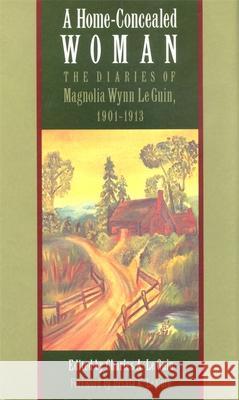A Home-Concealed Woman: The Diaries of Magnolia Wynn Le Guin, 1901-1913 » książka
A Home-Concealed Woman: The Diaries of Magnolia Wynn Le Guin, 1901-1913
ISBN-13: 9780820341026 / Angielski / Miękka / 2012 / 416 str.
A Home-Concealed Woman: The Diaries of Magnolia Wynn Le Guin, 1901-1913
ISBN-13: 9780820341026 / Angielski / Miękka / 2012 / 416 str.
(netto: 178,15 VAT: 5%)
Najniższa cena z 30 dni: 161,32
ok. 16-18 dni roboczych
Bez gwarancji dostawy przed świętami
Darmowa dostawa!
The world of Magnolia Le Guin, like that of countless farm women, was defined by and confined to home and family. Born in 1869 into the rural, white, agrarian society of Georgia's central piedmont, she raised eight children virtually on her own, yet never in her life ventured farther than thirty miles from her birthplace. Her situation, however extreme, was not unique in her day. What distinguished Le Guin was her love of writing, her need to write about being a wife and mother--despite a daunting workload and burden of responsibilities that left her with little free time or energy.
In a plain, idiomatic style, these diaries detail some of the most trying, but nonetheless fulfilling, years of her life. At the same time, "A Home-Concealed Woman" (her own self-descriptive phrase) provides a firsthand view of the hardships of subsistence farming, the material culture of rural society, and the codes to which Le Guin as a white woman, a southerner, and an evangelical Christian adhered.
The most striking feature of Le Guin's world is that it was confined almost entirely to the indoors, from the bedrooms where her children were born and where her parents lay ill and died to the stove room where the daily meals were cooked and cleared. Her husband's prominence in their small community and the size of their extended families meant that Le Guin hosted an endless flow of callers and overnight guests--more than one hundred in the summer of 1906 alone. Managing an already busy household under these conditions so occupied her time that she treasured every respite: "I was truly glad when I felt the sprinkling of the rain. I was so glad I couldn't content myself indoors washing dishes, sweeping floors, making beds, etc etc, so I just postponed those things and churning too awhile and betook myself out in the misty rain with a new brushbroom and swept a lot of this large yard and inhaled the sweet air scented with rain-settling dust."
Less idyllic sentiments also fill Le Guin's diaries, for the anger and anxiety she could not publicly express found a voice in their pages: "I feel rebellious once in awhile at my lot--so much drudgery and so much company to cook for and in meantime my own affairs, my own children, my little baby--all going neglected." Though condescending outbursts about her hired help reveal Le Guin's racial attitudes, her endemic prejudice is tempered by her many expressions of genuine concern for individual blacks close to her family.
As writer Ursula K. Le Guin suggests in her foreword, the diary may be the best suited literary form for approximating "the actual gait of people's lives." In Magnolia Le Guin's diary, prayerful entreaties for strength and guidance mingle with daily news about her family, providing a constant background against which major events such as births and deaths, holidays and harvests take place. The reader's admiration for Le Guin will grow as the details of her life emerge and accumulate.











